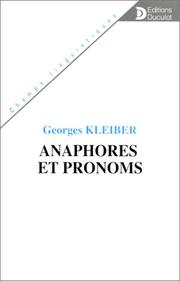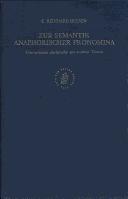| Listing 1 - 5 of 5 |
Sort by
|
Book
ISBN: 3484303077 3111355888 9783484303072 Year: 1994 Volume: 307 Publisher: Tübingen Niemeyer
Abstract | Keywords | Export | Availability | Bookmark
 Loading...
Loading...Choose an application
- Reference Manager
- EndNote
- RefWorks (Direct export to RefWorks)
Zur Topologie Im Mittelfeld: Pronominale Und Nominale Satzglieder.
German language --- Noun. --- Pronoun. --- Sentences. --- Word order. --- Grammar --- Word order --- Pronoun --- Noun --- Sentences --- Pronunciation --- Syntax --- Ashkenazic German language --- Hochdeutsch --- Judaeo-German language (German) --- Judendeutsch language --- Judeo-German language (German) --- Jüdisch-Deutsch language --- Jüdischdeutsch language --- Germanic languages --- German language - Word order --- German language - Pronoun --- German language - Noun --- German language - Sentences

ISBN: 2801110787 9782801110782 Year: 1994 Volume: *8 Publisher: Louvain-la-Neuve Duculot
Abstract | Keywords | Export | Availability | Bookmark
 Loading...
Loading...Choose an application
- Reference Manager
- EndNote
- RefWorks (Direct export to RefWorks)
Lexicology. Semantics --- French language --- Grammar --- Pragmatics --- Frans --- Français (langue) --- Grammaire --- Grammatica --- Français (Langue) --- Anaphora --- Pronoun --- Anaphore --- Pronom --- Langage --- --Philosophie --- --Cognition --- 4424 --- 2291 --- 804.0-56 --- -French language --- -#KVHA:Linguistiek; Frans --- Langue d'oïl --- Romance languages --- Frans: syntaxis; semantiek --- Anaphora. --- Pronoun. --- 804.0-56 Frans: syntaxis; semantiek --- Français (Langue) --- #KVHA:Linguistiek; Frans --- --Langage --- --French language --- Philosophie --- Cognition --- French language - Anaphora --- French language - Pronoun --- LINGUISTIQUE FRANCAISE --- ANAPHORE --- SYNTAXE --- PRONOM
Book
ISBN: 8815044981 Year: 1994 Publisher: Bologna Mulino
Abstract | Keywords | Export | Availability | Bookmark
 Loading...
Loading...Choose an application
- Reference Manager
- EndNote
- RefWorks (Direct export to RefWorks)
Generative grammar --- Germanic languages --- Grammar, Comparative and general --- Romance languages --- Grammar, Generative --- Grammar, Transformational --- Grammar, Transformational generative --- Transformational generative grammar --- Transformational grammar --- Psycholinguistics --- Neo-Latin languages --- Italic languages and dialects --- Language and languages --- Syntax --- Pronouns --- Teutonic languages --- Indo-European languages --- Grammar, Comparative&delete& --- Romance --- Pronoun --- Germanic --- Derivation --- Function words --- Nominals --- Reflexives --- Grammar --- Comparative linguistics --- Grammar, Comparative --- Linguistics --- Philology --- Grammar, Comparative and general Syntax

ISBN: 9004098321 9004451978 Year: 1994 Volume: 41
Abstract | Keywords | Export | Availability | Bookmark
 Loading...
Loading...Choose an application
- Reference Manager
- EndNote
- RefWorks (Direct export to RefWorks)
Lexicology. Semantics --- Historical linguistics --- Anaphora (Linguistics) --- Grammar, Comparative and general --- Language and logic --- Speculative grammar --- Anaphore --- Pronom --- Langage et logique --- Grammaire spéculative --- Pronoun --- 141.131 --- 800.1 --- -Anaphora (Linguistics) --- Modistic grammar --- Latin language, Medieval and modern --- Scholasticism --- Linguistics and logic --- Logic in language --- Language and languages --- Logic --- Semantics --- Cross-reference (Linguistics) --- Linguistics --- Reference (Linguistics) --- Comparative grammar --- Grammar --- Grammar, Philosophical --- Grammar, Universal --- Philosophical grammar --- Philology --- Platonisme. Neoplatonisme --- Taalfilosofie --- Philosophy --- Grammar, Comparative --- 800.1 Taalfilosofie --- 141.131 Platonisme. Neoplatonisme --- Grammaire spéculative --- Language and logic. --- Pronouns --- Function words --- Nominals --- Reflexives --- Grammar [Comparative and general ] --- Relative clauses
Book
ISBN: 0691244154 Year: 1994 Publisher: Princeton, New Jersey : Princeton University Press,
Abstract | Keywords | Export | Availability | Bookmark
 Loading...
Loading...Choose an application
- Reference Manager
- EndNote
- RefWorks (Direct export to RefWorks)
Few sources reveal the life of the ancient Romans as vividly as do the houses preserved by the eruption of Vesuvius. Wealthy Romans lavished resources on shaping their surroundings to impress their crowds of visitors. The fashions they set were taken up and imitated by ordinary citizens. In this illustrated book, Andrew Wallace-Hadrill explores the rich potential of the houses of Pompeii and Herculaneum to offer new insights into Roman social life. Exposing misconceptions derived from contemporary culture, he shows the close interconnection of spheres we take as discrete: public and private, family and outsiders, work and leisure. Combining archaeological evidence with Roman texts and comparative material from other cultures, Wallace-Hadrill raises a range of new questions. How did the organization of space and the use of decoration help to structure social encounters between owner and visitor, man and woman, master and slave? What sort of "households" did the inhabitants of the Roman house form? How did the world of work relate to that of entertainment and leisure? How widely did the luxuries of the rich spread among the houses of craftsmen and shopkeepers? Through analysis of the remains of over two hundred houses, Wallace-Hadrill reveals the remarkably dynamic social environment of early imperial Italy, and the vital part that houses came to play in defining what it meant "to live as a Roman."
Material culture --- Architecture, Domestic --- Architecture, Domestic --- Material culture --- Herculaneum (Extinct city) --- Herculaneum (Extinct city) --- Pompeii (Extinct city) --- Pompeii (Extinct city) --- Buildings, structures, etc. --- Social life and customs. --- Buildings, structures, etc. --- Social life and customs. --- Abdication. --- Aedicula. --- Alleius Nigidius Maius. --- Allusion. --- Ancillae. --- Antechamber. --- Apartment. --- Archetype. --- Architectural plan. --- Aristocracy. --- Art group. --- Author. --- Biography. --- Building. --- Cabinetry. --- City-state. --- Civil society. --- Clothing. --- Commius. --- Consideration. --- Contemporary society. --- Count. --- Credential. --- Cultural capital. --- Cultural history. --- Designer. --- Dowry. --- Dwelling. --- Dynasty. --- Economy. --- Edward Gorey. --- Ephesus. --- Etiquette. --- Exedra. --- Extended family. --- Floriculture. --- Freedman. --- Herculaneum. --- House plan. --- House. --- Household. --- Housing. --- Infrastructure. --- Insula (building). --- Interior design. --- Legatee. --- Literature. --- Living Space. --- Lodging. --- Magnificence (history of ideas). --- Mattress. --- Nobility. --- Occupancy. --- Opus sectile. --- Osteria. --- Ostia (Rome). --- Ownership. --- Parlour. --- Pergamon. --- Periodical literature. --- Peristyle. --- Pinacotheca. --- Political economy. --- Pompeii. --- Population density. --- Portico. --- Poster. --- Preservationist. --- Promiscuity. --- Pronoun. --- Proportion (architecture). --- Publication. --- Quartile. --- Residence. --- Residential area. --- Ruler. --- Show house. --- Social class. --- Social integration. --- Social position. --- Social relation. --- Social science. --- Social status. --- Society. --- Sociology. --- Studio apartment. --- Taberna. --- Tablinum. --- Tacitus. --- Tenement. --- Tibullus. --- Triclinium. --- Trimalchio. --- Ulpian. --- Usage. --- Vault (architecture). --- Vestibule (architecture). --- Vitruvius. --- Wallpaper. --- Workforce.
| Listing 1 - 5 of 5 |
Sort by
|

 Search
Search Feedback
Feedback About UniCat
About UniCat  Help
Help News
News